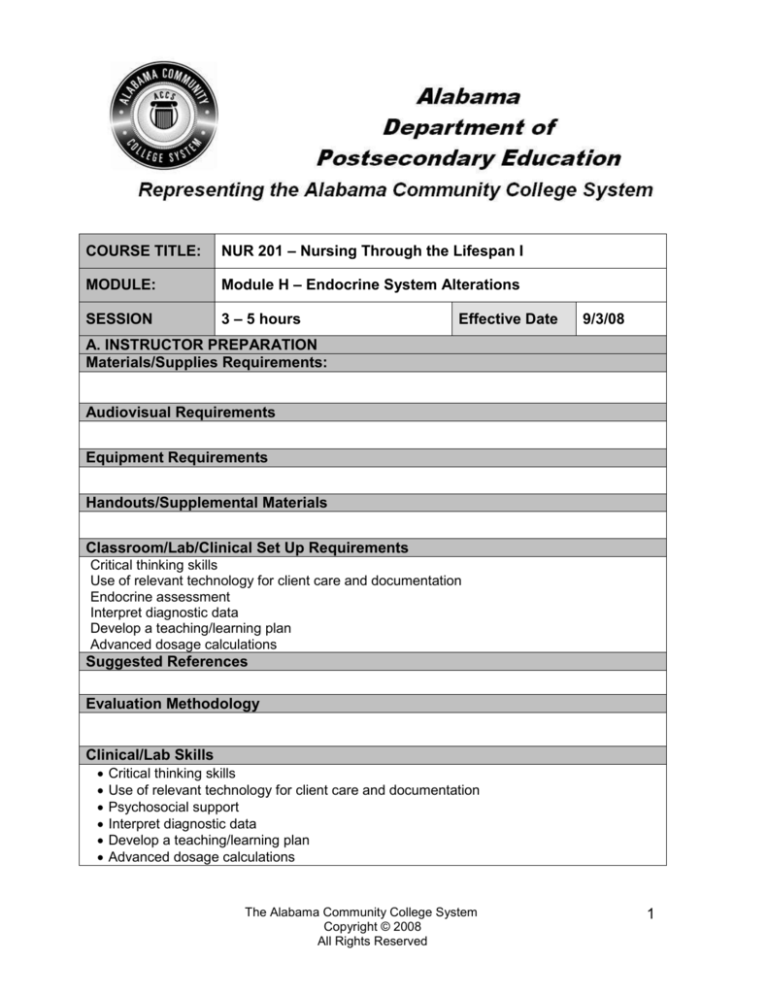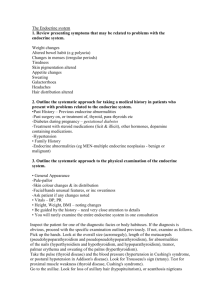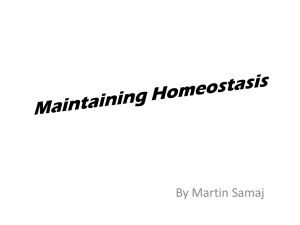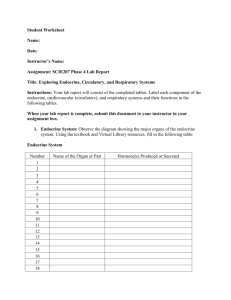
COURSE TITLE:
NUR 201 – Nursing Through the Lifespan I
MODULE:
Module H – Endocrine System Alterations
SESSION
3 – 5 hours
Effective Date
9/3/08
A. INSTRUCTOR PREPARATION
Materials/Supplies Requirements:
Audiovisual Requirements
Equipment Requirements
Handouts/Supplemental Materials
Classroom/Lab/Clinical Set Up Requirements
Critical thinking skills
Use of relevant technology for client care and documentation
Endocrine assessment
Interpret diagnostic data
Develop a teaching/learning plan
Advanced dosage calculations
Suggested References
Evaluation Methodology
Clinical/Lab Skills
Critical thinking skills
Use of relevant technology for client care and documentation
Psychosocial support
Interpret diagnostic data
Develop a teaching/learning plan
Advanced dosage calculations
The Alabama Community College System
Copyright © 2008
All Rights Reserved
1
Nursing Through the Lifespan I
Module H
NUR 201
B. COMPETENCIES AND OBJECTIVES
COMPETENCY
STUDENT PERFORMANCE OBJECTIVES
1.0 Provide care for clients with selected 1.1 Apply the nursing process for clients with
endocrine system alterations.
selected endocrine system alterations.
Instructor Notes:
ACCS Copyright © 2008
All Rights Reserved
2
Nursing Through the Lifespan I
Module H
NUR 201
C. LEARNING OBJECTIVES
Number Objective
H1.1.1
H1.1.2
H1.1.3
H1.1.4
H1.1.5
H1.1.6
H1.1.7
H1.1.8
H1.1.9
H1.1.10
H1.1.11
H1.1.12
H1.1.13
Define terms associated with selected endocrine system alterations.
Describe selected endocrine system alterations.
Describe the pathophysiology associated with selected endocrine system
alterations.
Describe the role of the nurse in providing care for clients experiencing selected
endocrine system alterations.
Interpret clinical manifestations of selected endocrine system alterations.
Interpret diagnostic tests for selected endocrine system alterations.
Describe the pharmacological agents and/or treatments for selected endocrine
system alterations.
Evaluate nutritional considerations for clients experiencing selected endocrine
system alterations.
Explain health promotion related to selected endocrine system alterations.
Identify expected outcomes of treatment modalities for clients experiencing selected
endocrine system alterations.
Evaluate the psychosocial needs of clients, family, and/or support systems.
Use critical thinking to manage nursing care for culturally diverse clients
experiencing selected endocrine system alterations.
Evaluate expected outcomes of nursing care for clients experiencing selected
endocrine system alterations.
H1.1.14 Identify impacts of selected endocrine system alterations on maternal and
pediatric clients.
Instructor Notes:
ACCS Copyright © 2008
All Rights Reserved
3
Nursing Through the Lifespan I
Module H
NUR 201
D. LESSON DEVELOPMENT
Theory = T
Lab = L
Clinicals = C
T
T
T
T
L
TEACHING POINTS
C
1.0 Terms associated with endocrine system alterations
Acromegaly
Exopthalmos
Addison’s disease
Glucocorticoids
Addisonian crisis
Graves’ disease
Adrenalectomy
Goiter
Adrenocorticotropichoromone Hashimoto’s disease
Androgens
Hormones
Adrenogenital syndrome
Hypophysectomy
Basal metabolic rate
Mineralocorticoid
Calcitonin
Myxedema
Chvotek’s sign
Negative feedback
Corticosteroids
Oxytocin
Cretinism
Pheochromocytoma
Cushings syndrome
Radioimmunoassy
Diabetes insipidus
SIADH
Dilutional hyponatremia
TSH
Dwarfism
Thyroid storm
Endocrine
Thyroidectomy
Euthroid
Thyroiditis
Exocrine
Thyrotoxicosis
C 2.0 Structure, function, and pathophysiology
Pituitary
Thyroid
Parathyroids
Adrenals
Pancreatic
Islets
Ovaries and testes
C 3.0 Selected alteration - Causes, clinical manifestations, diagnostic tests,
pharmacological agents and treatments, nutritional considerations,
treatment modalities, interventions, and expected outcomes, incorporating
cultural diversity.
3.1 Hypopituitarism
3.1.1 Simmonds
3.1.2 Contributing factors
3.1.2.1 Radiation therapy
3.1.2.2 Tumor
3.1.2.3 Trauma
3.1.2.4 Vascular lesions
ACCS Copyright © 2008
All Rights Reserved
4
Nursing Through the Lifespan I
Module H
T
NUR 201
T
C 4.0 Hyperpituitarism
4.1 Acromegaly
4.1 Pituitary tumors
C 5.0 Posterior pituitary gland
5.1 Diabetic insipidus
5.2 SIADH
5.3 Growth hormone insufficiency
C 6.0 Thyroid
6.1 Hypothyroidism
6.1.1 Myxedema
6.1.2 Hashimotos disease
6.1.3 Goiter
6.2 Hyperthyroidism
6.2.1 Graves’ disease
6.2.2 Thyrotoxicosis
6.2.3 Thyroid storm
6.2.4 Thyroid cancer
C 7.0 Hypoparathyroidism
T
C 8.0 Hyperparathyroidism
T
C 9.0 Adrenal gland
9.1 Addisons syndrome
9.2 Cushings syndrome
9.3 Pheochromocytoma
C 10.0 Endocrine system disorders in Pediatric and obstetric populations
10.1 Congenital adrenogential hyperplasia
10.2 Sheehan’s syndrome
10.3 Pregnant women and endocrine dysfunction
C 11.0 Use critical thinking in caring for clients with endocrine disorders.
11.1 Use case studies
C 12.0 Nursing care plan
12.1 Use case studies
C 13.0 Evaluate expected outcomes of nursing care plan
13.1 Use case studies
T
T
T
T
T
T
ACCS Copyright © 2008
All Rights Reserved
5
Nursing Through the Lifespan I
Module H
NUR 201
E. ASSIGNMENTS AND DUE DATES
F. SUMMARY AND REVIEW
ACCS Copyright © 2008
All Rights Reserved
6





